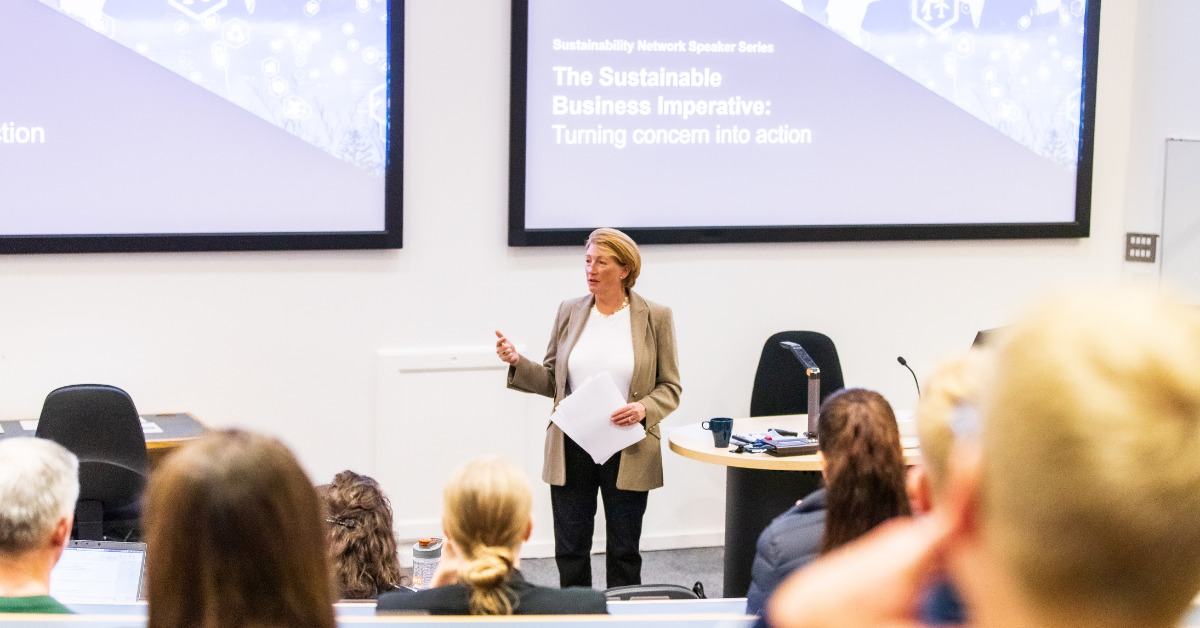The Sustainability Imperative: How to turn concern into action
17/01/2023

Our first Sustainability Network Speaker of this Academic year – 2022-23 – was the inspirational Cranfield Visiting Fellow, Sue Garrard. Sue has had an outstanding career as an advocate for sustainability, spanning both private and public sectors. From government she joined global giant Unilever as Executive Vice-President, Sustainable Living, supporting growth through building brands with purpose, fostering employee engagement and future-proofing the business. By the end of 2019 Unilever’s ‘sustainable living brands’ were growing 67% faster than its other brands, and represented 70% of the company’s growth. Sue now runs her own consultancy business, advising clients such as Mars and Danone on developing sustainability strategies and aligning these with their business objectives.
Sue gave her talk amidst a backdrop of environmental and political turbulence. Large areas of the world are afflicted variously by floods, droughts, the war in Ukraine and the ensuing disruption to global supply chains. Inflation in major economies is rampant and governments are struggling for solutions. At least, with the exception of China, the planet seems to be emerging finally from the scourge of Covid. Nonetheless, many environmentalists fear that the sustainability gains of recent years may be lost or abandoned. Instead of a bounce-back from the retreat of Covid, in the face of a cost of living crisis many businesses are looking to cut back wherever they can and sustainability, sadly, is in their sights.
The question arises, who will lead us out of this? It is Sue’s view that we cannot simply wait for government. Business must assume the mantle of leadership, and the rising generation of sustainability leaders must step up to the challenge. Consequently her talk addressed three major themes:
– why action now makes sense
– the common factors that define best practice
– and tips for converting concern into action
Why act now?
Business alone has the ability to effect rapid change on the ground. Capitalism may be imperfect, but it’s the system that we have and we must work with it. Leaving to one side the overwhelming moral arguments for action, the shift to sustainable business practices takes years to develop and implement. The sooner we start, then, the better. Companies that do not or cannot make a fundamental change to their business models face the prospect of extinction, like Kodak: once a household name, its failure to transform itself for the digital age consigned it to history. The war for talent provides another compelling reason. Covid has accelerated people’s need to find meaning and purpose in their work. The employees of the future are looking to work for companies that mirror their own values and will take to task businesses that fall short. And then there are customers. They may not necessarily pay a sustainability premium, or may opt for an inferior product, but equally they will not accept greenwashing or a company’s failure to conduct due diligence: the presence of pesticide in Evian mineral water, owned by Danone, even at levels harmless to human health, caused considerable and costly reputational damage to the brand.
The common features of best practice
Sue’s experience has shown how remarkably similar best practice is across geography and industrial sectors. Decisive sustainability leadership cuts across all functions and activities of an organisation. In its absence, businesses will move at the pace of the slowest. Unfortunately, not everyone grasps this fact and is ready to commit to it. Just as important is a recognition that sustainability is business strategy, not a mere nice-to-have to be side-lined when times get difficult. And it’s not CSR, which is too frequently a smokescreen of tokenistic activity behind which businesses hide. True sustainability runs throughout the business, not just at the fringes, which creates a challenge for business leaders contemplating an average tenure of five years and quarterly shareholder reports.
This underscores the importance of making the business case for sustainability, identifying not just the need to quantify and manage risks, but also articulating the long-term costs of taking no action versus acting promptly and responsibly. A strong business case raises the levels of trust among all stakeholders and creates opportunities to make companies more competitive. Everyone – the firm, its people, its consumers and the planet – wins. This is where the business case and the moral case meet, creating a powerful force for change.
To drive this forward requires the appropriate level of ambition. The best in class do what the science says needs to done. In the case of carbon, that means a reduction of 50% against the 2010 levels [as defined by the IPCC]. It’s a challenging goal which entails highly-stretching targets to deliver step changes in performance right across the value chain. Those at the leading edge of best practice also recognise that the changes needed are systematic, that they cannot do this alone. Thus they form partnerships and alliances across traditional industry sector boundaries to drive critical mass faster across entire markets.
Sue’s top tips
- Start with the “why”: why answers the basic human need for purpose.
- Break binary thinking: it’s not a case of either/or, but both/and.
- Build the business case: harness the growing evidence that sustainable businesses outperform their peers.
- Understand your customer: after all, your customer could well be your strongest advocate.
- Focus on a few big priorities: do not spread yourself too thinly. The big wins are the crucial ones.
- Limit what you publish: support your priorities with high-quality advocacy.
- Put accountability in place: be absolutely clear about where the buck stops.
- Focus on impact: you will be judged ultimately by your actions.
In conclusion
Every one of you can make a difference. Everyone has to. You need to be courageous, determined and clear-thinking.

Sue delivered this talk as part of the MSc Sustainability programme taught here at Cranfield University. You can listen to the full recording of this Sustainability Network Speaker series event via our Sustainable Business webpage.
Categories & Tags:
Leave a comment on this post:
You might also like…
From classroom to cockpit: What’s next after Cranfield
The Air Transport Management MSc isn’t just about learning theory — it’s about preparing for a career in the aviation industry. Adit shares his dream job, insights from classmates, and advice for prospective students. ...
Setting up a shared group folder in a reference manager
Many of our students are now busy working on their group projects. One easy way to share references amongst a group is to set up group folders in a reference manager like Mendeley or Zotero. ...
Company codes – CUSIP, SEDOL, ISIN…. What do they mean and how can you use them in our Library resources?
As you use our many finance resources, you will probably notice unique company identifiers which may be codes or symbols. It is worth spending some time getting to know what these are and which resources ...
Supporting careers in defence through specialist education
As a materials engineer by background, I have always been drawn to fields where technical expertise directly shapes real‑world outcomes. Few sectors exemplify this better than defence. Engineering careers in defence sit at the ...
What being a woman in STEM means to me
STEM is both a way of thinking and a practical toolkit. It sharpens reasoning and equips us to turn ideas into solutions with measurable impact. For me, STEM has never been only about acquiring ...
A woman’s experience in environmental science within defence
When I stepped into the gates of the Defence Academy it was the 30th September 2019. I did not know at the time that this would be the beginning of a long journey as ...






